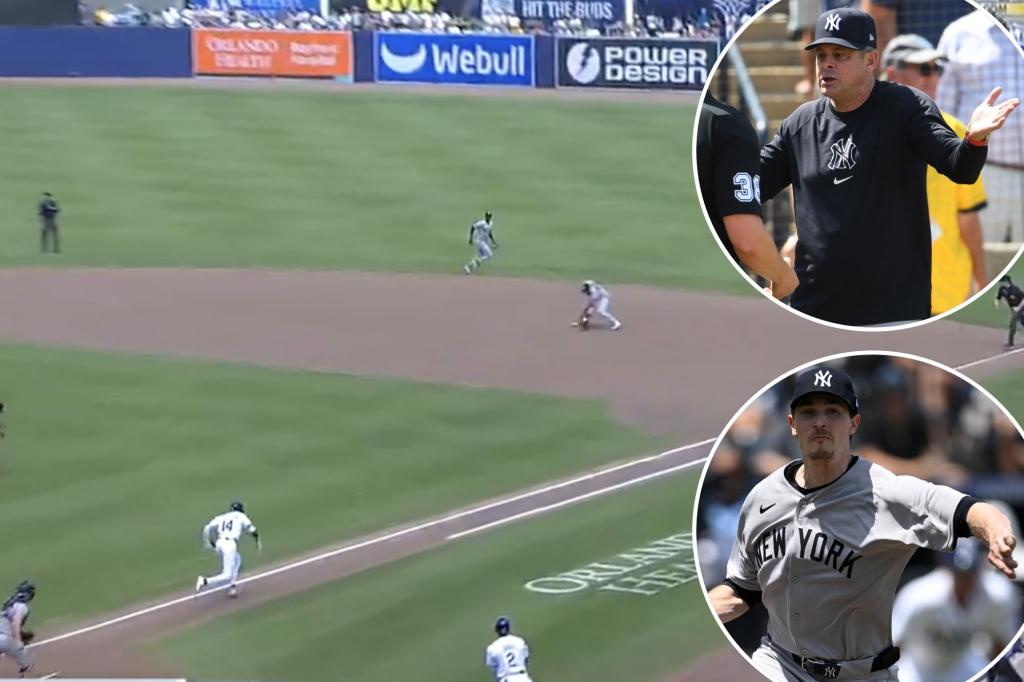CLEVELAND — At the end of the day, putting aside the drama and controversy surrounding the fact that it took two innings to happen, the official scorer got it right.
Chandler Simpson’s ground ball off the glove of Paul Goldschmidt in the sixth inning Sunday at Steinbrenner Field was a hit, and had Max Fried not been working on a no-hitter at the time, it may well have been called as such in the moment given Simpson’s lightning-quick speed.
Of course, it was initially ruled an error and then changed to a hit in the middle of the eighth inning as Fried jogged out to the mound thinking he still had a no-hitter intact, only to essentially lose it twice: on the scoring change and, a few minutes later, a clean leadoff single by Jake Mangum.
“The reality is it was a hit,” manager Aaron Boone said afterward of Simpson’s grounder.
But the snafu opened the door for some commentary on the state of official scoring around the league, and Boone barged through to offer his thoughts.
“Look, I scratch my head at the official scorers nightly,” Boone said. “I mean, they throw an error up on the board at Yankee Stadium, and then we go to these other places, and they can fire up a hit with the best of them. It’s a different game in every other park; it really is. I’m sure there are some that are similar.
“But there’s times I get involved in the year, like, ‘What are we doing?’ ”
There has been much more leniency around the league in recent years, with plenty of stadiums eager to call something a hit rather than an error on anything close to a toss-up play. Yankee Stadium, as Boone noted, has often been an exception to that trend.

“Look, it’s probably a very thankless job, a hard job with a lot on the line,” Boone said of official scoring. “I certainly respect that and respect how hard [it is], but there are issues I have from time to time with some places it’s very hit-friendly, other places it’s not.
“But look, we’re talking about it affects one guy, once a year. I’m talking through this a lot. So I guess overall, I’m actually OK with it. But I do have issues sometimes, the difference in places.”
The player most affected by Sunday’s scoring change, Fried, took little issue with it. If that had been the only hit, perhaps the Yankees would have been singing a different tune, but it was not.
“I try not to look into that stuff,” he said. “I just know [Simpson] was on first base, so it doesn’t matter to me if it’s a hit or an error.”
Ultimately, no harm was done by the scoring change. But there is one alternate universe in which it might have.
If Simpson had been credited with a hit immediately in the sixth inning and Fried only had a one-hitter through seven innings at 92 pitches, would he have even gone out for the eighth? Because what if the Yankees let Fried work that deep only because they thought he was still working on a no-hitter into the eighth inning and he ultimately got hurt in that frame?

Boone said they still would have sent Fried out to start the bottom of the eighth, in part because the bullpen was so thin after having to cover 15 ¹/₃ innings through the first three games of the series. But Fried’s season high before Sunday was 98 pitches and his career high was 110. The Yankees were not going to let him go past the 120-range, even if he still had a no-hitter going.
“Our calculus, we talked about it before the [eighth] inning, ‘Are we going to send him back out?’ I was like, ‘Yes,’ ” Boone said. “How much that [the no-hit bid] was part of it — I think I send him back out, at least hitter to hitter there.
“There’s a conversation to be had there if he gets through the eighth, where he’s at. I think he was a little bit gassed, so I don’t know what the final number [would have been]. But I wouldn’t have just let him [go] no matter what, that’s for sure.”
